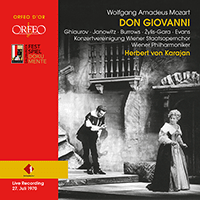Stuart Burrows
Stuart Burrows began his professional life as a schoolteacher, but after winning a major singing prize at the 1954 Welsh National Eisteddfod he studied singing formally at Trinity College, Caermyrddin. His operatic stage début came in 1963 with the Welsh National Opera Company as Ismaele/Nabucco. Other rôles here included Rodolfo/La Bohème, Macduff/Macbeth, the Duke/Rigoletto, Ernesto/Don Pasquale and Hans/The Bartered Bride.
In 1967 Burrows was invited by Stravinsky to sing the title part in his Oedipus Rex at Athens and made his début at Covent Garden the same year as Beppe/Pagliacci, becoming a regular guest with the Royal Opera Company. Here he specialised in the lyric tenor repertoire with parts such as Fenton/Falstaff, Ferrando/Così fan tutte, Elvino/La sonnambula, Ernesto, Lensky/Eugene Onegin, Alfredo/La traviata and the title rôles in Idomeneo and Gounod’s Faust. Also in 1967 he appeared for the first time with the San Francisco Opera as Tamino/Die Zauberflöte, which was to become one of his signature rôles. It was in this part that Burrows made his début at the Vienna State Opera in 1970, quickly followed by Don Ottavio/Don Giovanni, a rôle he undertook the same year at the Salzburg Festival with Herbert von Karajan conducting.
Burrows made his début at the Metropolitan Opera, New York, in 1971 as Don Ottavio. In twelve consecutive seasons he gave seventy-eight performances as Tamino, Fenton, Alfredo, Belmonte/Die Entführung aus dem Serail, Pinkerton/Madama Butterfly and the title rôle in Gounod’s Faust. Throughout the 1970s and 1980s Burrows led an active international career, singing in Europe at Paris, Brussels and the festivals of Aix-en-Provence and Orange, and in the USA at Houston and San Diego. He extended his repertoire to include Tito/La clemenza di Tito, (Brussels 1982 and Covent Garden 1989) and Hoffmann/Les Contes d’Hoffmann (Cologne and Brussels) but by the early 1990s was turning to less arduous rôles, such as Don Basilio/Le nozze di Figaro (Aix-en-Provence, 1991).
A warm and naturally humorous character, loved by colleagues throughout the operatic world, Burrows possessed one of the most beautiful lyric tenor voices of his generation. He sang with taste and delicacy, never seeking to extend his range beyond rôles he could perform with ease and elegance.
© Naxos Rights International Ltd. — David Patmore (A–Z of Singers).

















